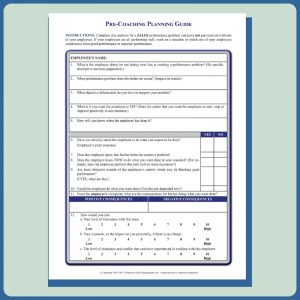
by James Schneider | Feb 27, 2019
Add Your Email Below to Download Our World-Class Pre-Coaching Planner… for FREE.
Today’s downloadable toolbox guide is the top guide for Coaching and Developing Sales Talent.
Banks and Credit Unions all around the country use Schneider Sales Management, Inc’s forms to work one-on-one with employees to set the goals that improve sales revenue, improve customer service, and improve employee performance.
Download the form above by entering your email address, or forward this page to a financial industry sales manager who you want to see improve quickly.
Preparation Will Focus Your Coaching
You can cut through to the real leverage point for improving an employee’s performance by asking yourself the few simple questions shown on the Pre-Coaching Planning Guide on the next page. This form puts an employee’s nonperformance in perspective so you can diagnose the real cause of the performance problem, and you can ask for the appropriate corrective action by an employee.
Understand Your Employees’ Behavior
Always ask yourself how often and how well an employee does what you want him/her to do. If an employee has never done what you want him/her to do, you probably have a training problem.
If he/she has done it before, but doesn’t do it consistently, or if he/she does it poorly, you probably have a motivation problem, or a coaching problem.
If you’re still not sure that you’ve identified the right performance problem, ask yourself if the employee could and would ever do it, even if his/her job depended on it. If your answer is no, you probably have a job fit problem, and more coaching isn’t the right solution.
Get Clarity on Specific Improvements
Finally, the most important step in all of your performance analysis is to define in one sentence, very specifically, what it is that you want the employee to do to improve his/her performance.
If you can’t do this, you haven’t yet identified the real performance problem, and you won’t be clear in telling the employee what action to take to improve.

by James Schneider | Feb 21, 2019
In the financial industry, different job roles require different core competencies.
For each job role, some core competencies are more important that others, and your evaluation of candidates should give extra attention to assessing those few critical attributes. Some attributes are nice to have, but the core competencies should be considered “must have.” Don’t overvalue one competency at the expense of others. Star performers typically have strengths across a range of competencies for their optimum selling role.
Competencies are the skills, abilities and motivations that actually cause effective and/or superior performance in a job role. A characteristic is not a competency unless there is evidence that indicates that possession of the characteristic precedes and leads to effective and/or superior performance in a job as measured on a specific criterion or standard.
Distinguishing competencies are those skills or abilities that differentiate superior performance from average or poor performance such as a salesperson setting goals higher than the goals required by the organization.
Here are some of the core competencies and sample job roles for each type of selling. Take a look and see if you’re valuing the competencies for each role that are going to make the biggest difference for your bottom-line revenue.
Service Selling
Core competencies:
Achievement Drive, Initiative, Energy, Organization Skills, Sociability, Empathy
Sample job roles:
• Teller
• Receptionist/Greeter
• Contact Center Rep (In-bound service)
• Loan Processor
Consultative Selling
Core competencies: Achievement Drive, Optimism, Adaptability, Social Leadership, Creative Quick Thinking, Organization Skills
Sample job roles:
• Personal Banker/Universal Banker
• Customer Service Rep.
• Member Service Advisor/Personal Banker
• Contact Center Rep (In-bound sales)
• Consumer Loan Officer
• Internal Mortgage Originator
• Insurance Consultant
• Investment Officer
Competitive Selling
Core competencies: Achievement Drive, Drive to Persuade, Optimism, Resilience Energy, Organizational Skills
Sample job roles:
• Business Development Officer
• Small Business Banking Officer
• Trust Officer–Employee Benefits
• External Mortgage Originator
• Wholesale Mortgage Lender
• Contact Center Rep (Outbound Sales)
Complex Selling
Core competencies: Achievement Drive, Empathy, Self-Control, Planning & Analytical Thinking, Social Leadership, Organization
Sample job roles:
• Commercial Loan Officer
• Trust BDO/Administrator
• Wealth Management Advisor
• Private Banker
• Cash Management Officer
Sales Supervision
Core competencies: Achievement Drive, Empathy, Developing Others, Optimism, Collaboration, Planning & Analytical Thinking
Sample job roles:
• Business Unit Manager
• Regional Manager
• Branch Manager
• Sales Manager
• Assistant Branch Manager
• Operations Supervisor
• Contact Center Supervisor


by James Schneider | Jan 23, 2019
Most sales leaders treat all people and all selling situations as if they were the same. They’re not. A 7’7″ basketball player like former NBA player Manute Bol may not be very skilled at shooting and dribbling, but he may be the player on the team best fit to rebound and to block shots. Similarly, an employee may not have the patience, empathy and planning skills to succeed at long cycle selling, but he may be our company’s best salesperson at prospecting and closing short cycle transactional sales.
National research of high performing salespeople in the financial services industry by Schneider Sales Management, Inc. has proven that almost all sales positions and all distinguishing sets of sales competencies can be described by five selling roles based on the behavioral requirements for success in the job. These roles are appropriate for all financial institutions based on the behavior competencies required to perform each role.
All top producing salespeople have some crucial competencies in common, such as strong achievement drive, but each selling role requires some competencies that are different than those required for other selling roles.
If you are a hiring manager or a sales manager, it is your responsibility within your bank or credit union to define clearly what each employee’s role in selling is, and to fit the right people to the right role to build a successful team.
Choosing the right sales practices, the right performance metrics and the right coaching priorities is easy once you’ve defined each employee’s role in selling.
Here is more information on each of the five main financial industry selling roles in banks and credit unions.
Service: Job requires servicing customer transactions and maintaining friendly customer relations, and may require conducting some referral or suggestive selling.
Consultative Selling: Job requires completing sales and service transactions, advising customers on product selection or use, closing first sales quickly, making add-on or follow-up sales, and managing selected customer relationships in primarily in-store, customer-initiated conversations. In blended sales and service positions the job may also require proactive outreach to approach and engage in-store customers to create sales opportunities.
Competitive Selling: Job requires continuous prospecting, competing for sales persistently despite high rejection rates, conducting minimal after-sale servicing, and closing competitive sales in one or two interviews using emotional pressure.
Complex Selling: Job requires closing large, complex or technical sales over a long selling cycle, analyzing prospect problems and product applications to propose customized solutions, networking socially for new business, and retaining and developing customer relationships over time.
Sales Supervision: Job primarily requires direct supervision and coaching of sales personnel and/or their supervisors, and typically requires some personal selling. In senior level positions the job also requires sales planning.
by James Schneider | Jan 23, 2019
Add Your Email to Download the #1 Form for Negotiating and Setting Sales Goals in the Financial Industry… for FREE.
Today’s downloadable toolbox form is the #1 form for Negotiating and Setting Sales Goals with financial industry salespeople. Banks and Credit Unions all around the country use these forms to work one-on-one with employees to set the goals that improve sales revenue, improve customer service, and improve employee performance.
Download the form above, or forward this page to a financial industry sales manager who you want to see improve quickly.
Set sales goals that help your employees stretch to increase revenue.
The most basic measurement of a sales leader’s performance is the percentage of employees that he/she supervises that meet or exceed their projected sales goals.
How you set these goals with each employee is vital to whether or not employees take ownership and strive to meet and beat those goals.
The sales goals you set determine the revenue and potential of each employee.
Goal setting must be done in face-to-face meetings with each person who reports to you. You get commitment by talking to people, not by writing to them. Allocate enough uninterrupted time to the task to do it right.
Goals should be high enough to motivate people to give extra effort and low enough to seem possible and to provide frequent opportunities for success and positive reinforcement. The motivation to achieve a goal is highest when the perceived likelihood of success is about 50%.
Generally, the higher the goals, the better the performance, provided a difficult goal is accepted as important and attainable. However high the goal, you MUST hold the employee accountable for achieving the goal.
Employees are frequently too optimistic in their forecasting. These are your goals, too, so you want them to be realistic. When an employee seems overly optimistic, say, “20% would be great, but let’s shoot for 10% for now. When we get that, we’ll try for something higher.”
Ask HOW each goal can be achieved
The only way to be sure that an employee’s goals are realistic is to ask the employee how he/she intends to accomplish his/her goals. Ask each employee what he/she could do to move his/her goals to the stretch goals, and then keep asking what else he/she could do and offering you own suggestions until it seems there isn’t much more he/ she could do. At that point you’ve probably reached a reasonable expected goal for his/her performance to include in your budget.
Negotiate sales goals that fit the opportunity and competency of each employee
Use questions to negotiate. It’s crucial that you gain each employee’s commitment to realistic goals that are neither too low or too high. The best way to do this is to use questions to force each employee to think through fully how he/she could accomplish his/ her proposed goals.
Follow-up to Help Push Employees Forward
Once an employee’s goals have been set, the sales manager’s final role in goal setting begins— following up to ask the employee about his/her progress in accomplishing the goals and continually refocusing on him/her on his/her best opportunities to accomplish the goals.
Ask your employees about their progress toward their goals frequently and sell them on the high probability of their achieving them. When a sales leader frequently checks an employee’s progress against a goals prior to the deadline, the employee is more likely to believe that he/she can achieve the goals. You MUST follow-up.
Hold each employee accountable for his/her goals. Employees engaged in long cycle selling should be given feedback on their progress toward their goals at least weekly, and branch employees should report their sales daily. Remind your employees that they’re setting goals for their own benefit, and that they’re letting themselves down by not meeting them.

by James Schneider | Jan 19, 2019
For many banks, universal banker has delivered on the promise of cost savings, seamless service, and recognition of more sales opportunities. Most banks, however, have had poor results. Here’s why.
To save money, most banks simply promote their existing teller staff to the much more proactive universal banker role and eliminate entirely the role of personal bankers who provide in-depth sales advice and make outbound calls. They install performance metrics and compensation that rewards efficiency over sales productivity. Little or no training is done to teach universal bankers how to approach customers and convert assisted transactions into sit-down appointments.
And then we wonder why another interesting innovation in customer experience fails. For advice on how to maximize sales from your universal banker team, call us at (303) 221-4511.

by Mike Shallanberger | Dec 19, 2018
Will AI, in-branch, and self-help technology replace salespeople at banks and credit unions? The simple answer is NO according to a gathering of banking and tech thought leaders at the recent Future Branches conference in Austin, TX. But it will change how branch sales roles function, and add some key competencies required for salespeople.
While technology helps tremendously with understanding customer behavior, prospecting, and creating great customer journeys, there will always be a need for salespeople who can form and maintain relationships as a trusted advisor. No technology can build trust the way a great salesperson with keen emotional intelligence can. People are also needed to handle the sale of complex products, and to sell the benefits of new technology in order to drive adoption.
An article in the Harvard Business Journal suggests that, “Humans will need to focus on managing exceptions, tolerating ambiguity, using judgment, shaping the strategies and questions that machines will help enable and answer, and managing an increasingly complex web of relationships with employees and customers.”
For deeper conversations about how your bank or credit union hiring and sales practices may change as technology changes, sign up for the Schneider Report now.









